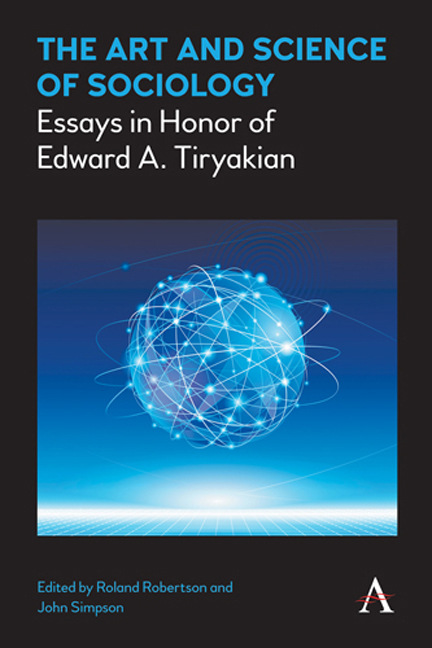Book contents
- Frontmatter
- Contents
- List of Figures and Tables
- List of Contributors
- Acknowledgments
- Introduction
- Chapter 1 The Dynamo and the Diplomat: Tiryakian's Role in Preserving Sorokin's Reputation
- Chapter 2 Edward Tiryakian and Modernization Theory: A Very Special Relationship
- Chapter 3 Developmental Path (Entwicklungsform): A Neglected Weberian Concept and Its Usefulness in the Civilizational Analysis of Islam
- Chapter 4 The Existential Sociology of Edward Tiryakian: Toward an Integrated Paradigm
- Chapter 5 Comparative Reflections on Sociology and Conservatism: The Contributions of Edward A. Tiryakian
- Chapter 6 Contemporary Changes in the Processes of Social Differentiation: Toward an Analytical Version of the Theory
- Chapter 7 Considerations on Global Studies
- Chapter 8 Honoring Edward Tiryakian as a Metasociologist: A Metaconceptual Analysis of Prosumption and Related Concepts
- Chapter 9 Dangerous Nouns of Process: Differentiation, Rationalization, Modernization
- Chapter 10 Modernization as Social Becoming: Ten Theses on Modernization
- Chapter 11 Religion and Evolution
- Chapter 12 The “Axial Age” vs. Weber's Comparative Sociology of the World Religions
- Edward A. Tiryakian's Publications
- Index
Chapter 3 - Developmental Path (Entwicklungsform): A Neglected Weberian Concept and Its Usefulness in the Civilizational Analysis of Islam
Published online by Cambridge University Press: 22 July 2017
- Frontmatter
- Contents
- List of Figures and Tables
- List of Contributors
- Acknowledgments
- Introduction
- Chapter 1 The Dynamo and the Diplomat: Tiryakian's Role in Preserving Sorokin's Reputation
- Chapter 2 Edward Tiryakian and Modernization Theory: A Very Special Relationship
- Chapter 3 Developmental Path (Entwicklungsform): A Neglected Weberian Concept and Its Usefulness in the Civilizational Analysis of Islam
- Chapter 4 The Existential Sociology of Edward Tiryakian: Toward an Integrated Paradigm
- Chapter 5 Comparative Reflections on Sociology and Conservatism: The Contributions of Edward A. Tiryakian
- Chapter 6 Contemporary Changes in the Processes of Social Differentiation: Toward an Analytical Version of the Theory
- Chapter 7 Considerations on Global Studies
- Chapter 8 Honoring Edward Tiryakian as a Metasociologist: A Metaconceptual Analysis of Prosumption and Related Concepts
- Chapter 9 Dangerous Nouns of Process: Differentiation, Rationalization, Modernization
- Chapter 10 Modernization as Social Becoming: Ten Theses on Modernization
- Chapter 11 Religion and Evolution
- Chapter 12 The “Axial Age” vs. Weber's Comparative Sociology of the World Religions
- Edward A. Tiryakian's Publications
- Index
Summary
Edward Tiryakian offered a masterful formulation of a key neglected concept, dedifferentiation (Tiryakian 1985), and has proposed rethinking civilizational analysis (Tiryakian 2001). It therefore seems appropriate to dedicate the exploration of an idea for civilizational analysis that may prove seminal to him. In rethinking civilizational analysis, our paradigm for analyzing the relation between world religions and axial civilizations as adumbrated by Max Weber and S. N. Eisenstadt readily suggests itself as the best starting point, and yet it is too abstract and badly in need of being historicized. In proposing a concept to assist the task of historicization, I will briefly go back to a key referent of Tiryakian's concept of dedifferentiation, namely Herbert Spencer.
Much of my work in progress seeks to historicize Islam as a world religion and the Islamicate civilization that grew around it, from the Nile to the Oxus, by moving away from the monistic and ahistorical, one-ideal type, one-religion approach followed by many Weberians, and by applying instead Max Weber's own notion of developmental patterns to axial civilizations in their formative period(s) and beyond. As part of this work in progress, I here explore this historicizing approach in connection with a pluralistic conception of axial civilizations— in my case, the Islamicate civilization—as consisting of normatively autonomous (eigengesetzlich) domains, each with its own developmental pattern, which can interact or conflict with those in other domains.
In his seminal essay, “Progress: Its Law and Causes,” written in 1857, the year before Darwin's On the Origin of Species, Herbert Spencer equated “social progress” with “social evolution,” consisting in “changes of structure in the social organism” (Spencer 1972: 38–39). Spencer found evolution to be a universal process in nature and in human society: “in the development of Society, of Government, of Manufactures, of Commerce, of Language, Literature, Science, Art, this same evolution of the simple into the complex, through successive differentiations, holds throughout.” In all these developments, “the transformation of the homogeneous into the heterogeneous is that in which Progress essentially consists.” (Spencer 1972: 40). Furthermore, “The change from the homogeneous to the heterogeneous is displayed equally in the progress of civilization as a whole, and in the progress of every tribe or nation” (Spencer 1972: 41–42).
- Type
- Chapter
- Information
- The Art and Science of SociologyEssays in Honor of Edward A. Tiryakian, pp. 43 - 58Publisher: Anthem PressPrint publication year: 2016

